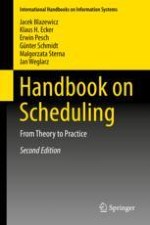This handbook provides a comprehensive introduction to the theory and applications of scheduling in advanced planning and computer systems. It addresses a broad audience including practitioners and researchers interested in scheduling, as well as graduate and advanced undergraduate students in the fields of computer science and computer engineering, operations research, industrial and real-time engineering, management science, business administration and information systems, and applied mathematics.
The book begins by providing an introduction to and basic concepts from discrete mathematics. Single and multiple processor systems are covered, with a focus on multiprocessor tasks and hard real-time systems. Flow shop and open shop scheduling, as well as scheduling in job shops, are explained in detail. Issues like limited processor availability, time-dependence, resource constraints and imprecise computations are dealt with in dedicated chapters. Special attention is given to online scheduling, constraint programming and disjunctive scheduling. The book also features applications and cases involving flexible manufacturing systems, computer integrated production scheduling and logistics. In particular it presents case studies on optimization procedures for the production of acrylic glass and of helicopter parts in a flexible manufacturing system, an efficient decision support system for airport gate scheduling, concrete delivery planning, and berth and quay crane allocation at seaports.
